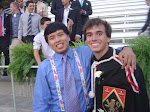Ok I’m going to try to pull together a couple ideas that have been buzzing around my head, some for weeks, others for months. So here we go in the order that makes sense to me.
First up is a conversation I had at Mel’s with a good friend in the weeks before graduation. As a recurring commitment of ours ended for the final time, we discussed the feeling of all the duties, titles and responsibilities we had been given or accumulated throughout the years being stripped away. “I’m in high school” *nah uh* “I go to Harvard-Westlake” *no you don’t* “I’m on the newspaper” *check next year’s staff box*
It leaves one with the haunting feeling of nakedness. Because after all, as my friend Dr. Zeuss so eloquently put it, we come to define ourselves not by who we are, but by what we do. And as we stop doing those things that we do, there’s that void and feeling of being placeless.
With that ending though comes the requisite new beginning. As the image you crafted for yourself, or the labels that stuck to you against your will become remnants of your past, you have the chance to start all over again. Terrifying if you loved who you were. Liberating if you didn’t. Probably somewhere in between for most people. Definitely exciting.
But the thing is, even though I just wrote about the “chance to start all over again,” the truth is that chance doesn’t really exist. It does exist in the sense of the things that you do, but when you dig deeper to who you really are, some intrinsic force, “soul” (or call it what you will) that sticks with you throughout your life experience, that chance never really existed.
That soul however is what guides you to choose who you are and of course what you do and the path your life takes for your life’s duration.
Now to step back into the concrete for a moment. As a Prefect this year at Harvard-Westlake in a turbulent year chockfull of Honor Code issues, I was involved in lots of different discussions and asked lots of interesting questions. One question that stuck with me for the last few months was one that went something like this:
“I have my own set of morals that I follow irrespective of Harvard-Westlake’s Honor Code. I don’t know what the Honor Code says. I don’t care about the Honor Code. I’m a perfectly fine law-abiding person already. Why should I care about the Honor Code?”
I always felt like this was such an easy question, but I was never able to really articulate my answer clearly. I would stumble through an explanation that contained in parts, “It’s your duty” and “you signed your name to the Honor Code in 7th grade” and a couple helpings of angry frustration at my inarticulate answer.
But now that I’m a little bit removed from it all, I think I’ve gained some more clarity into it all (with the help of Sonya Mitchell's senior column.).
Sonya writes, “…I realized a sad but accurate fact: the class of 2008 is a mere piece of the Harvard-Westlake mosaic.”
That fact doesn’t strike me as sad at all. And it makes perfect sense. Just as we talked about before, that Harvard-Westlake student was merely what I did, not who I was. So to borrow Sonya’s language, that identity was just a mere piece of the David Alpert mosaic. And as we covered before, it was just a mere cursory piece, especially relative to the deeper soul in that mosaic of me.
So to make the biggest leap here in my thinking and complete the analogy, the class of 2008 was not who Harvard-Westlake was, but “what it did.” The myriad accomplishments and identities in my class and every other class don’t really matter because they are passing phenomena. The same goes for the teachers, the classes, the sports teams, et al. So that begs the question, if my thinking suggests that everything Harvard-Westlake is known for is merely “what it did,” then what really is Harvard-Westlake? What is its soul?
And here we are, finally back at the Honor Code. I don’t mean to suggest that a decade-old code of ethos comprises the entirety of the school’s soul, especially considering the current lack of respect it garners, but take a look at the facts. It has already survived countless coaches, teams, classes and administrators. So I think it plays a pretty hefty part in that soul.
And that ladies and gentlemen, is why you should care about the Honor Code. For while you and your own set of morals are good for your own life, while you are living out the part of “what you do” that is Harvard-Westlake student, you’re beholden to the maintenance, or even betterment, of the soul of the institution. So in a way my answer hasn’t moved all that far from “it’s your responsibility.” But there’s a lot more depth to that responsibility than it might appear on the surface.
Yep, I like the sound of that answer. What do all y’all think?
Subscribe to:
Post Comments (Atom)


No comments:
Post a Comment